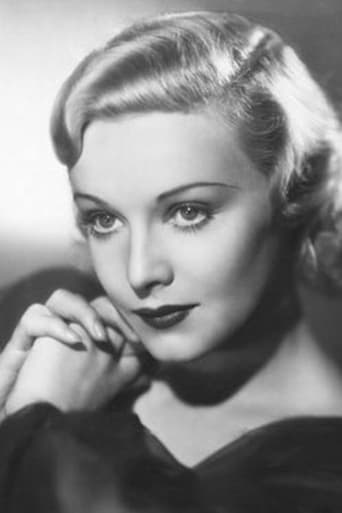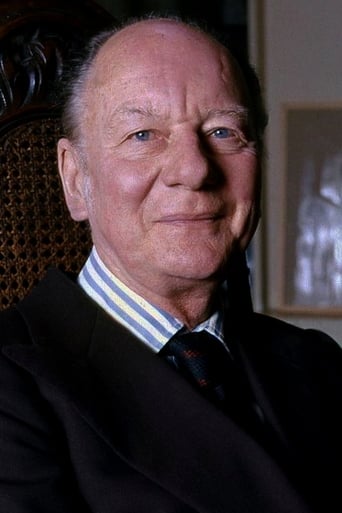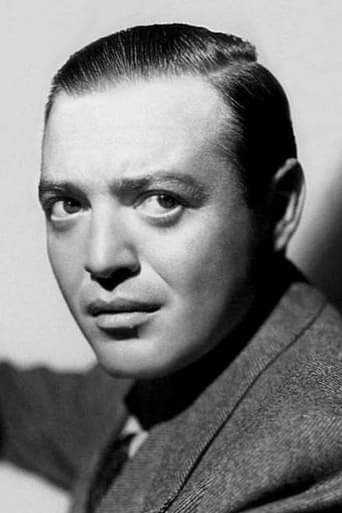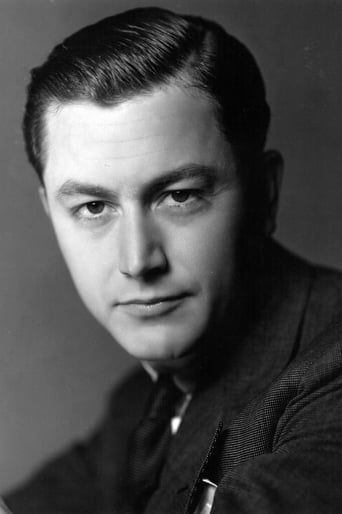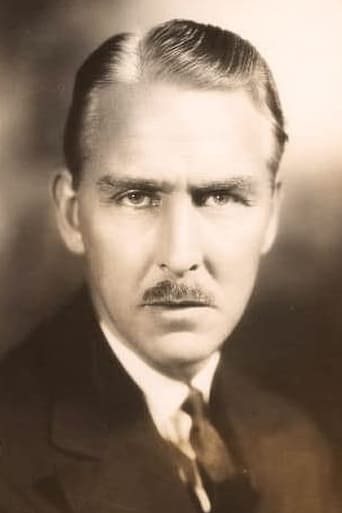Claysaba
Excellent, Without a doubt!!
Jonah Abbott
There's no way I can possibly love it entirely but I just think its ridiculously bad, but enjoyable at the same time.
Deanna
There are moments in this movie where the great movie it could've been peek out... They're fleeting, here, but they're worth savoring, and they happen often enough to make it worth your while.
Cheryl
A clunky actioner with a handful of cool moments.
ElMaruecan82
Failure might not be the right word to describe "Secret Agent" but it would be a lie to say that the film stands among his best work, especially when you consider the masterpiece he's made one year before.Maybe Hitchcock peaked too soon with "The 39 Steps" and still needed to polish his style but the film contained all the ingredients of escapism and entertainment while "Secret Agent" can only count on a competent cast, Hitchcock's confident directing but rather forgettable material as far as the plot goes.The film is an adaption of a Sommerset Maugham's spy-themed novel with World War I as the backdrop but unlike its predecessor (and to some degree "The Man Who Knew Too Much") the film goes in too many directions for its own good, it tries to be a serious character study with a romantic subplot yet it was obviously conceived as a lighthearted spy thriller. At the end, we get many mood whiplashes between scenes meant to be serious and highlighting the hazardous job of 'secret agents' and moments you couldn't take seriously even as comedy. There are many thrilling parts of course, some of them are purely Hitchcockian but they actually work better than their set-ups. Hitchcock just forgets to warm up his audience like a coach would do to his players before a game. Or maybe did I feel that way because the main character Brodie aka Richard Ashenden, played by John Gielgud, left me cold?Gielgud plays a British soldier and novelist who finds out the news about his death, then learns from a man named "R" that he's assigned to find and kill a German spy trying to stir disorder in the Middle-East. The least that can be said is that he's not ecstatic about the mission, the only good news is that there is a "Mrs. Ashenden" assigned to help him, Elsa Carrington played by "39" star Madeleine Carroll. But Gielgud plays such a "colorful" fellow that he needed an extravagant foil, so he's seconded by the "Hairless Mexican" aka the "General" an elfin version of Gomez Addams with frizzy hair, not a general nor a Mexican, but for all I know, Peter Lorre could pass as red-haired Viking if it guaranteed genuine moments of nervous scares. Put together, his diminutive size and his instinct for killing make him quite uncomfortable to watch, reminding us how the actor of "M" was born to play sinister villains whose sad eyes could still inspire sympathy.
Now, maybe Lorre meant well and needed to make up for Gielgud's wooden acting but sometimes he tries too hard and you might as well imagine Ralph Fiennes impersonating a constipated Christopher Plummer while pairing with Joe Pesci playing Leo-Getz while channeling Tommy De Vito. For once, the Hitchcockian sense of humor humor and the suspense that keeps you on the edge mix like oil and water. At the end, the most Hitchcockian of all characters is Robert Young, who plays the flirtatious and hammy Marvin, Brodie's "rival".So, this is an oddball but sympathetic "menage a trois" with a fourth wheel assigned to a mission on which rely the lives of millions of British men. A military man, a woman who became an agent "for kicks" and a little buffoon with an Harpo-like obsession. While we follow the unlikely trio throughout the mission, many moments stand out: the first murder where the lasting sound of an organ never stops, creating an ominous atmosphere in the church, only to reveal that the organist was dead all along head on the keyboard and the clue from that murder... leading to another murder, far more dramatic.The killing of the presumed spy intercut with the howling of his dachshund was pretty powerful and indicated an interesting shift of tone. But what could have been a pivotal moment of the film was handled in such a casual way I couldn't take it seriously anymore. Just when I accepted that they were too soft for the job, I couldn't believe they wouldn't literally breakdown at the thought of killing an innocent man. The General's reaction made sense at least, Brodie seemed as distraught as if had spilled broken his grandmother's china and Elsa thought it was the moment to open her heart to Brodie. Was I the only one who cared for Mr. Caypor?The rest of the film is good without being transcending, the chocolate factory scene with the covered noise is one of these Hitchcockian treats served in delicious packages and with a nice wrap, though it has a feeling of deja tasted. And the climactic sequence indicates Hitchcock's early predilection for memorable climactic settings or the clever uses of trains, if the film was one tenth the intensity of its last ten minutes, it might have been "one of these Hitchcock films".Maybe it's because Young and Lorre steal the show while Gielgud and Carroll gets over-carried by the romance. Young is the suave and not so dumb villain and Lorre is just a tad too psychopathic but of course the two die at the end and one of them in the dumbest possible way, I guess it had to end with the triumphing couple... although Elsa did nothing to make the mission help, and came close to ruining the whole plot. But all ends well that goes well, the British side is shown victorious and "R." gets a telegram where the Brodie and Elsa announce that they quit.And now there's a mistake Hitchcock would never have done in his prime, the director loved abrupt endings that wrapped things up. And the telegram said everything we needed to know so we didn't need that last close up on their happy faces, it looked corny and incongruous and Gielgud is not Stewart or Grant when it comes to display happiness. I guess "Secret Agent" was a forgotten Hitchcock because it's a forgettable Hitchcock movie or just a forgettable film, period.
bbmtwist
This was Hitchcock's third espionage thriller in a row (after THE MAN WHO KNEW TOO MUCH and THE 39 STEPS), clearly having found his niche in his UK sound film career. This shares a good deal with its predecessor. Both involve espionage and budding romance. In this the identity of the sought after spy is cleverly hidden until the end of the film, but as with THE 39 STEPS, the McGuffin has been in front of our noses since the beginning of the film.Madeleine Carroll appears a second time as the female lead, as she did in 39, and again proves herself a very good actress, both dramatically and romantically. Gielgud is a surprise, playing a contemporary role without a bit of his later assumed effeteness or accented theatrical voice. Robert Young is an anomaly – what is an American actor doing in a UK film??? As usual it is Peter Lorre who steals the film, as he did with THE MAN WHO KNEW TOO MUCH, this time giving an entirely different supporting performance as an emotionally wild Hispanic hit man. The release year was the first for the Supporting Actor category at the Oscars and he was undeservedly overlooked – a nomination was certainly in order.The film is set in 1916, during WWI, though there is no attempt to use period clothing. There are many memorable moments: the drone of the organ throughout the scene where the first body is discovered slumped over the instrument; the false clue of the button's owner at the roulette table; the chase through the train at the end, mirroring a similar scene in 39. The great suspense center piece of the film involves cross-cutting between the assassination scene and a domestic tea party, with the anxiety of the event going on outside superbly registered in both Carroll's facial movements and the behavior of the intended victim's agitated pet.It ends rather abruptly and not too satisfactorily, as if Hitch had run out of ideas. There is one goof when Young refers to Carroll's Adam's Apple. Women don't possess this feature, which belong entirely to the male anatomy.All in all, this is stylish, elegant, a mix of humor and intense drama, that is wonderfully entertaining. My print ran 1:25:53. Highly recommended.
Tweekums
It is hard to assign this inter-war Hitchcock thriller to any one genre... it is clearly a spy thriller but there are also romantic elements and a good number of comic moments.John Gielgud plays writer Edgar Brodie who returns from service in France in 1916 to learn that he has died while on leave! This is all part of establishing his new cover as Richard Ashenden; he is to go to neutral Switzerland with a man known as 'The General' to identify and eliminate a German agent before he can get to Constantinople. When Ashenden gets to Switzerland he is surprised to hear that his 'wife' Elsa has got there ahead of him; when he goes up to his room he finds a beautiful blonde wearing nothing but a towel and an American by the name of Robert Martin. It turns out that his boss, known as 'R', had sent her to improve his cover; he isn't impressed at first though as he sees her as a thrill seeker who doesn't really know how deadly their mission might be. They both learn when Ashenden and The General find their contact dead; the only clue to the killer is a button the dead man is clenching. That night at the casino Ashenden accidentally drops the button onto the roulette table. There is a bit of a laugh when it lands on the winning number then another player says he things it must be his... he is an Englishman married to a German woman; as he is undoubtedly the spy Ashenden and The General work up a plan to dispatch him. When the job is done Elsa no longer feels what they are doing is exciting and glamorous; it is grubby work... and it seems even grubbier when they learn that they got the wrong man! I lead puts them in the right direction but by then their target is on the move; heading to Constantinople which is in enemy territory.This Hitchcock film may be over seventy five years old but it doesn't feel particularly dated because it has a decent plot that has a few nice twists without being so convoluted it is hard to follow. The cast did a good job with a young John Gielgud putting in a sold performance as Ashenden; Madeleine Carroll was delightful as his 'wife' Elsa... I certainly won't forget her introductory scene and Peter Lorre was particularly entertaining as this lecherous, slightly creepy 'foreign gentleman'; The General. As one would expect from Hitchcock it was shot in a way that captured the tension of the situation... if you are a fan of Hitchcock's other works or just want to see a thriller that doesn't involve any offensive material then this is well worth watching.
drystyx
This is the very sort of thriller that defines "Hitchcock", and what he can do.It's a spy thriller in which the hero must be an unwilling participant in an assassination of an enemy agent.That's the main story, which underlies the "thriller" part of the film.Even in 1936, audiences knew who the "spy" was, if only by the way the film was "billed", and the genial nature of the man we know will be the spy.We also know that the first "assassination victim" will be wrongly killed, an innocent man.Three agents are involved in the assassination. The hero and heroine are very guilt ridden, and question their ethics. The third, played by Lorre, is the ultimate assassin, a professional who has no qualms about his duty.The "assassination" scene, with the cutaways to the dog, is a landmark scene, one of the greatest directorial achievements ever. The emotion is unsurpassed in cinema, and it didn't take a huge budget. Just brilliance in directing.This is the "suspense", "wit", "drama", and "style" that Hitchcock was famous for. This was his ultimate achievement. Don't pay attention to those who lambaste it. There is still jealousy in this business, and they're lambasting is simply a cover up. This is a classic film.

